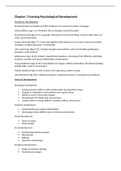Chapter 1 Framing Psychological Development
Periods of development
Prenatal period (conception to birth): Preference for sounds of mother’s language
Infancy (Birth to age 1,5): Preverbal, fear of strangers around 8 months
Preschool period (Age 1,5-4): Language, think about non-present things, memory skills, theory of
mind, social interactions
Young school age (Age 5-7): Social and cognitive skills expand, learn to read, memory and maths
strategies, complex discussion, TV influential
Later school age (Age 8-12): Complex thoughts and problems, sefl-control (delay gratification,
impulses), social network
Adolescence (Age 13-20): Puberty, hypothetical situations, risk taking, thrill, difficulty controlling
impulses, romantic and sexual relationships, independence
Young adulthood (Age 21-30): Consolidation of changes, wildness diminishes, detailed knowledge,
applied skills, career or homemaker
Middle adulthood (Age 31-60): Variety in life expectancy, patterns shape
Late adulthood (Age 60+): Individual variations, experience present, remember past positively
Areas of Development
Perceptual development
People grow the ability to pick up information by using their senses
Changes in integration of information and to guide action
Ability to move in the world changes
Development of reflexes and consciousness
Usually shown in young children (crawling, walking, catching etc)
Cognitive development
Understanding and usage of information
Developing mental abilities such as memory and attention
Moral development
Sense of values
Ethical beliefs
Social development
Relationships between people
Attachments
Bullying
Romantic relationships
Emotional development
Range of emotions shaping
Motivational changes
,Qualitative change: new kind of structure or process emerges that was not present before.
(developmental psychology stages of development)
Quantitative change: same structures and processes remain but show differences in the magnitude.
(Focus: mental and physical processes and capacities)
Studying psychological development
Chapter 3 Perception
Sensation: stimulation of sense organs
Perception: interpretation of sensations
Colour constancy: Perceiving objects as having same colour under different conditions of
illumination (lightning)
Methods in infant research (above)
Categorical perception: Cluster stimuli that vary along continuum into discrete categories
Speech:
lip release start of consonant
Voicing: vibration of vocal cord
Colour perception
No bands in shades of grey
Bands in colour
Language-free system results from maturation, present in infancy
Language-based system develops during pre-school years, based on experience
, Depth perception (Cue=perceivable entity that is informative about feature of environment e.g.
line)
Dynamic Cues (from 0 months onwards)
Rely on relative motion of stationary objects against background
Effective on faraway objects
Reliable in nature
Do not require good visual acuity
Useful in early infancy
Binocular Cues (from 1 to 4 months onward)
Rely on differences between eyes to estimate distance
Eyes focus on something close: “schielen”
Pictorial Cues (from 4 to 6 months onward)
Indicate distance from viewer on two dimensional surface
Interposition
Texture gradients
Convergence in distance
Perspective illusion
Face perception
Newborns prefers normal faces over scrambled face (elements in face are scrambled e.g. eyes at
bottom, mouth at top)
Newborns do not prefer normal faces over distorted face (distance between elements in face
changes)
Levels of analysis
Proximate: mechanism, development (ex.: how does the brain develop so that a bird can sing?)
Ultimate: function, phylogeny (ex.: why does a bird sing this specific song? Why is this mechanism
favoured in this species?)
Social dominance
Animals: relative size predicts dominance (non-dominant access to resources)
Violation of expectation (method in infant research)
Chapter 4 The emerge of action
Motor development
Each life stage faces different challenges
Fertilized egg
Challenge: Grow healthy body and mind
Skill: Repair mutations
Infant
Challenge: learn to walk, socialize, and more
Skills: Reflexes and learning mechanisms







